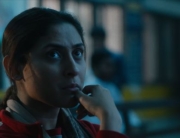The Lesson, a haunting portrait from Bulgaria, begins with a serious, hard-working teacher, Nade, scolding the children in her grade-school English class for petty theft: one of them has taken cash out of her purse. However, she soon encounters a more pressing problem when she realizes her husband has been stealing her mortgage payments to buy alcohol. She must find some way to come up with all of the missing money, soon, or she will lose her house.
The Lesson is more like a painting than a story. It captures a moment when Nade realizes she is on the brink of financial ruin. Nade has the entire burden of supporting herself and her young daughter, with her husband more focused on repairing a broken-down trailer than anything else. She tries everything to collect money to pay down her mortgage, but there are some things she won’t allow herself to do, such as apologize for her rude behavior toward her very wealthy father’s new wife.
The directors, Kristina Grozeva and Petar Valchanov, went for a starkly realistic feel in the film’s editing, with very long takes, such as when Nade maneuvers carefully around her husband’s trailer, which blocks the entrance to their home. These sequences give the viewer the sense of being in her shoes. The pacing is slow and deliberate, at times excruciatingly so, yet there is a visceral tension running throughout.
Sometimes, movies like this can fail if the character in focus is not compelling enough. However, with extremely strong acting by Margita Gosheva (Nade), this film is a pleasure to watch. Gosheva’s presence is magnetizing, irresistible. For example, in a scene where Nade struggles to apologize to her father and stepmother to receive financial assistance, Gosheva suddenly adopts a petulant, childish demeanor, giving a layer of depth to her otherwise totally responsible character, and making the audience understand why she won’t accept what seems like the easy way out of her situation.
At times, the story wrapped together more neatly than expected, using conventional movie tropes. After a certain point, it’s easy to guess where the plot is going. However, this film is more about the journey than the story. Grozeva and Valchanov use sparing, but exquisitely well-chosen dialogue, and there are also a few laugh-out-loud moments as Nade struggles with a bank’s bureaucracy, with the clerks arguing over pennies owed.
Although it is titled “The Lesson,” the film never tries too hard to pass any kind of judgment on Nade or the choices she makes. There’s no lesson here. She is simply a person, neither wholly good nor wholly bad, acting in a world that is sometimes cruel, and almost always unfair.







Leave A Comment